With the rise of artificial intelligence (AI) and the coaching industry, life coaches are flooded with new tools, software, and templates. The upside? A massive pool of resources. The downside? It’s a lot to wade through.
Finding the right life coaching plans, tools, or templates can make sessions flow more effectively (and make your business easier to run). This guide curates free, trusted resources for coaches into three categories:
We’ll also share coach-tested tips for picking the right resources and ideas for personalizing life coaching templates along the way.
Coaching Session Planning Tools
In this section: Resources to structure sessions, track progress, and support client goals.
What is a Coaching Plan?
A life coaching plan is your roadmap for guiding clients toward results over one session or a whole program. It may include:
- Client forms: intake paperwork, coaching agreements
- Session templates: outlines for client discussions, exercises, reflection prompts
- Program templates: multi-session roadmaps (for example, a 6- or 12-week program)
- Coaching frameworks: step-by-step models like GROW, CLEAR, and STEPPA
A good coaching plan template is structured (to keep you organized), repeatable (for consistent results), and adaptable (to fit different clients’ needs).
How Do I Pick an Effective Coaching Plan?
Business coach Dielle Charon recommends looking for these key qualities of an effective coaching plan or program:
- Starts with clients’ questions, not your assumptions
- Focuses on one result or goal per program
- Breaks goals into clear, actionable steps
- Anticipates questions and roadblocks
- Uses real-world examples and makes applications to their life
- Speaks your clients’ language (and skips the coaching jargon)
Watch Charon’s How to Build Your Coaching Framework video for a breakdown of what to look for. We gathered a few of our favorite downloadables from reliable sources that meet her criteria (plus, they’re free!)
Top Life Coaching Plans & Agendas (Free Resources)
Client Intake Form Template
University of Oregon
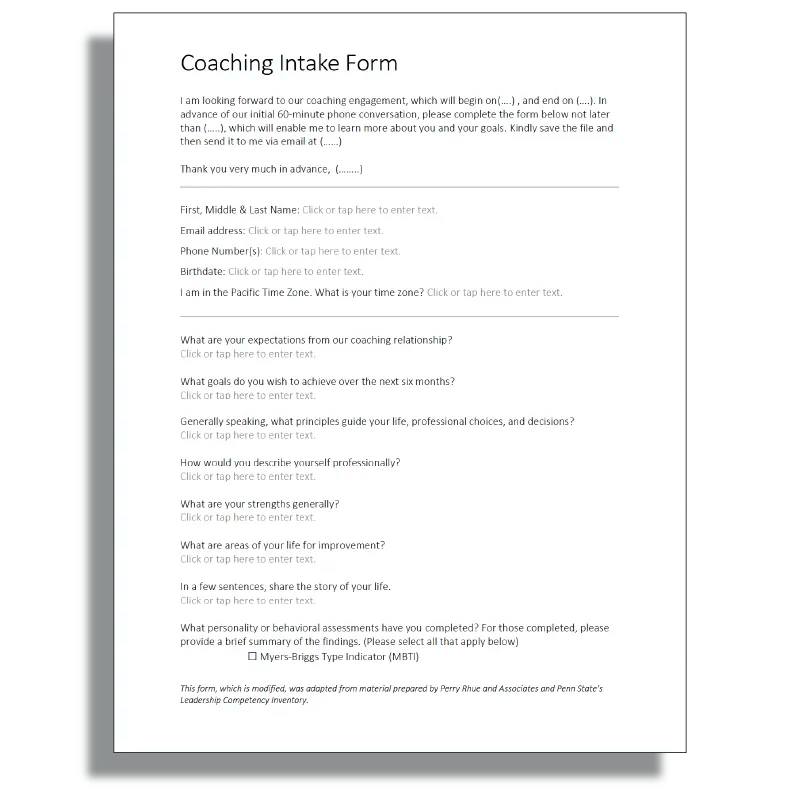
Understand client needs and learning styles before session one with this pre-session paperwork for new clients
Coaching Agreement Template
International Coaching Federation (ICF)
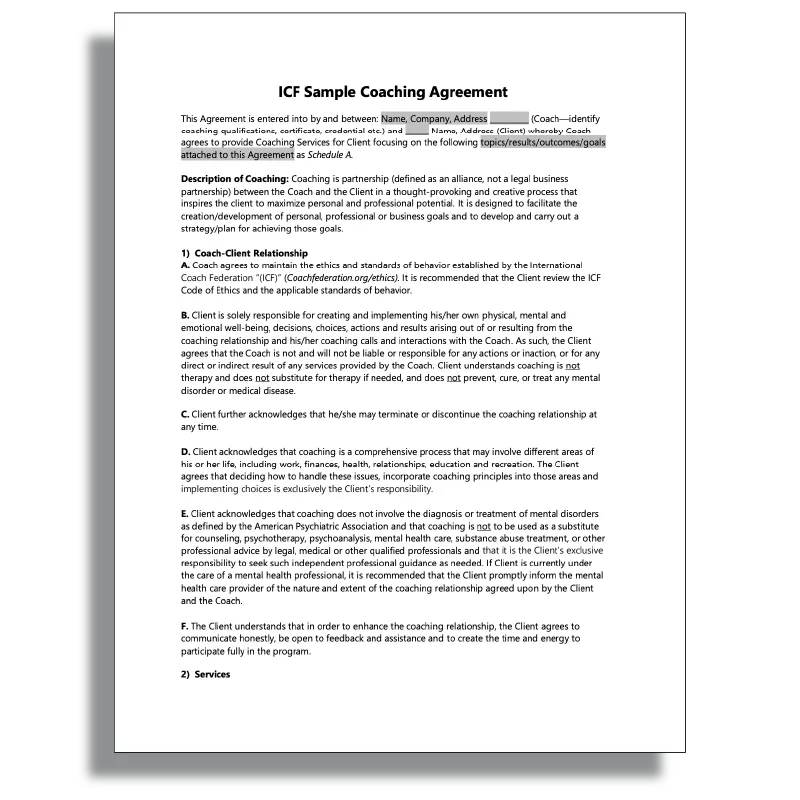
A sample coaching contract that sets expectations and policies while adding an extra layer of legal protection. (We suggest having a lawyer help you adapt ICF’s template to fit your practice.)
One-on-One Coaching Session Template
Evercoach
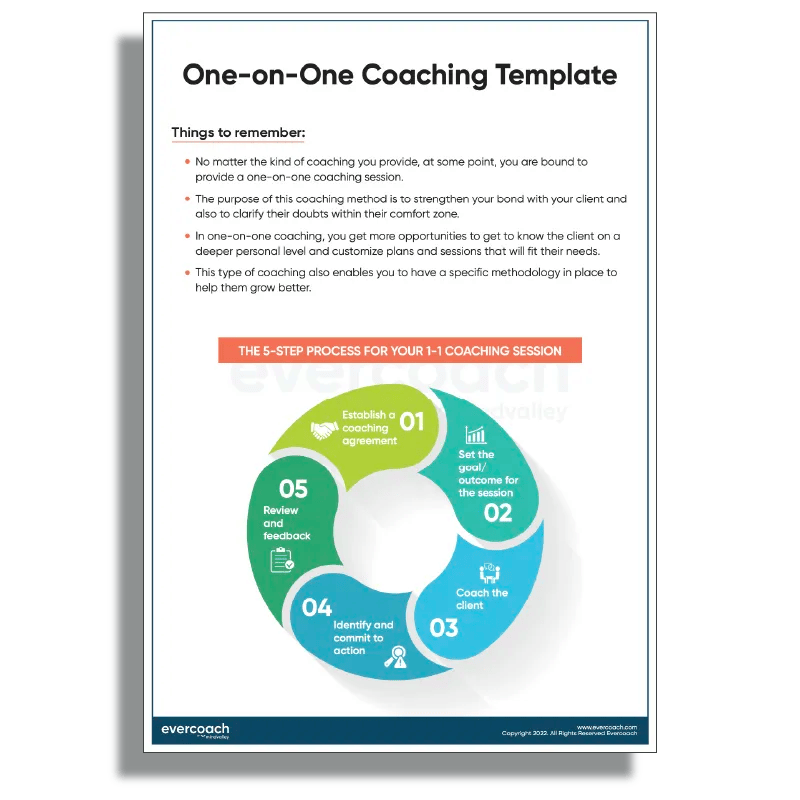
A big-picture coaching program roadmap that brings a client from intake to results
Individual Coaching Session Plan
Universal Coach Institute
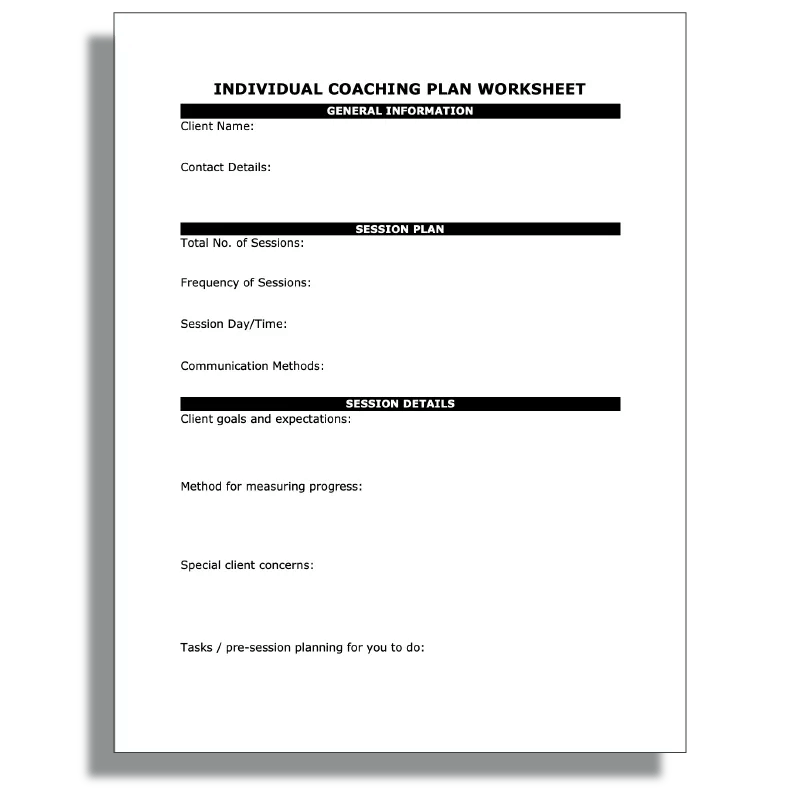
Keeps you organized during a session with sections for notes, exercises, and goal tracking
Choosing a Coaching Framework
Co-Active Training Institute
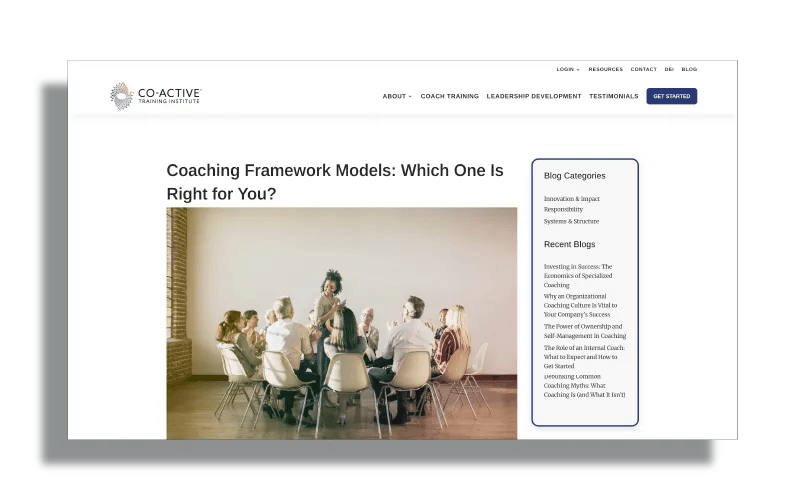
Explains popular coaching frameworks that break sessions into repeatable steps with helpful acronyms
Designing a 12-Week Coaching Program
Mindvalley Coaching
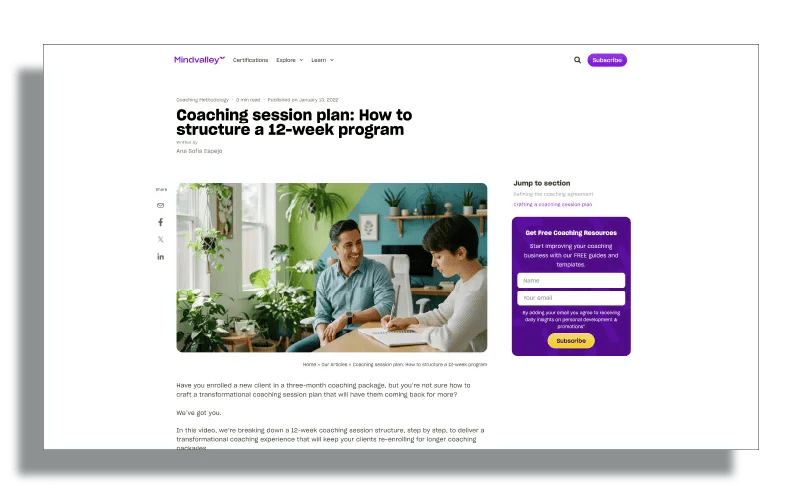
An example of a structured, multi-week plan for progressive client growth
How to Personalize a Coaching Plan Template
Life coaching isn’t one-size-fits-all, and neither are coaching plan templates. In fact, the more you customize free tools to fit your coaching style or your current client, the better they’ll work for you. Give yourself freedom to adapt plans by:
- Skipping or reordering framework steps for your clients’ needs and pace
- Extending or shortening programs (with client approval)
- Adding, subtracting, or combining exercises for a custom fit
AI Prompts for Customizable Life Coaching Exercises
We know, AI feels like cheating, but using this tool correctly can give you hundreds of creative, personalized approaches and exercises tailored to your clients. Think of it this way: AI is an idea generator — you’re the coaching expert who picks the right idea.
Assigning an ICF Core Competency to each AI suggestion or adapting your results to fit industry standards helps ensure your new exercises have substance.
Customize for Client Personality
Give me five ideas to adapt this coaching session for a client with an analytical personality. Include exercises, discussion questions, and reflection prompts. [Upload your coaching plan.]
Follow-Up Session / Progress Review Ideas
Create three options for a follow-up session outline to the following session. [Include an outline of last session.] Include exercise ideas for reviewing past goals, tracking progress, and setting next steps tailored to the client’s current challenges.
Time Management Support
Adapt this 60-minute session plan into a 30-minute session plan for a client considering a career change. Include discovery questions, goal-setting exercises, and follow-up assignments. [Include your 60-minute plan.]

Digital Safety Tip: Always omit identifying client details when using open source AI. Confidentiality matters and helps limit your liability risks!
Life Coaching Templates
In this section: Resources to structure sessions, track progress, and support client goals.
What Is a Life Coaching Template?
Life coach templates are ready-made starting points for sessions, programs, or business tasks. Examples include:
- Free life coaching worksheets: Designed reflection prompts, exercises, and activities
- Business planning templates: Frameworks for planning business financials, goals, and marketing strategy
- Goal tracking: Progress and accountability tools for you and clients
How Do I Pick Effective Life Coach Templates & Assessments?
It seems like every coaching platform has its own library of templates. How do you know what’s worth your time? To spot trustworthy life coaching templates, ask yourself:
- Does it come from a trusted source (an authority in coaching, business, or my niche)?
- Is it tested by coaches or coaching certifiers?
- Is it easy to customize for me or my clients?
- Does it have built-in accountability and action tools to apply the results?
Top Life Coaching Templates & Exercises
Free business plan template tailored to coaches with a SMART goals worksheet to translate ideas into actionable plans
Powerful Coaching Questions
University of North Texas
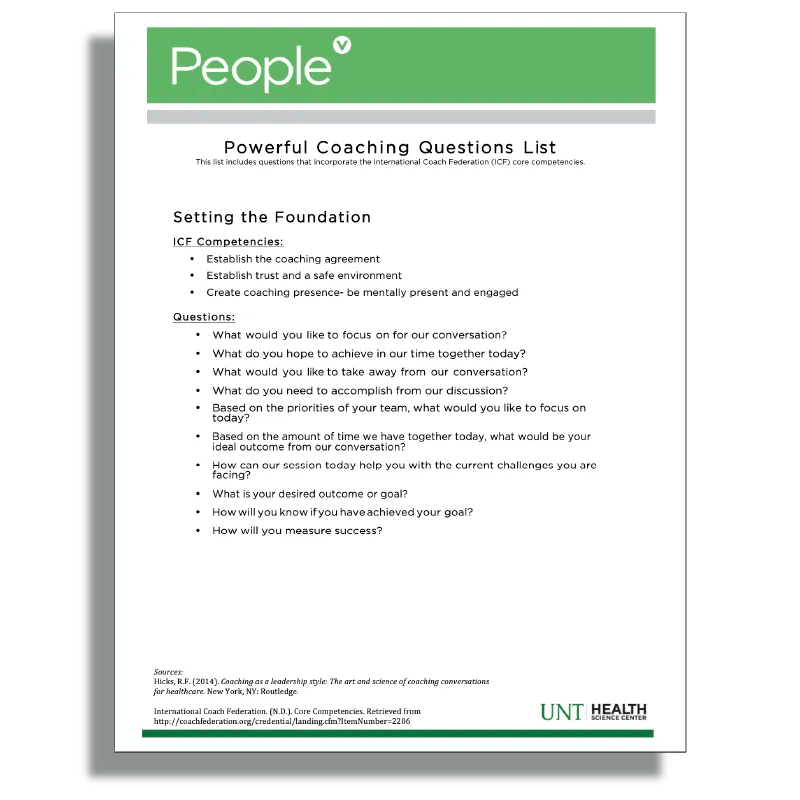
Conversation-deepening questions tied to ICF Competencies
SMART Goal Setting & Action Plan
Lake Superior State University
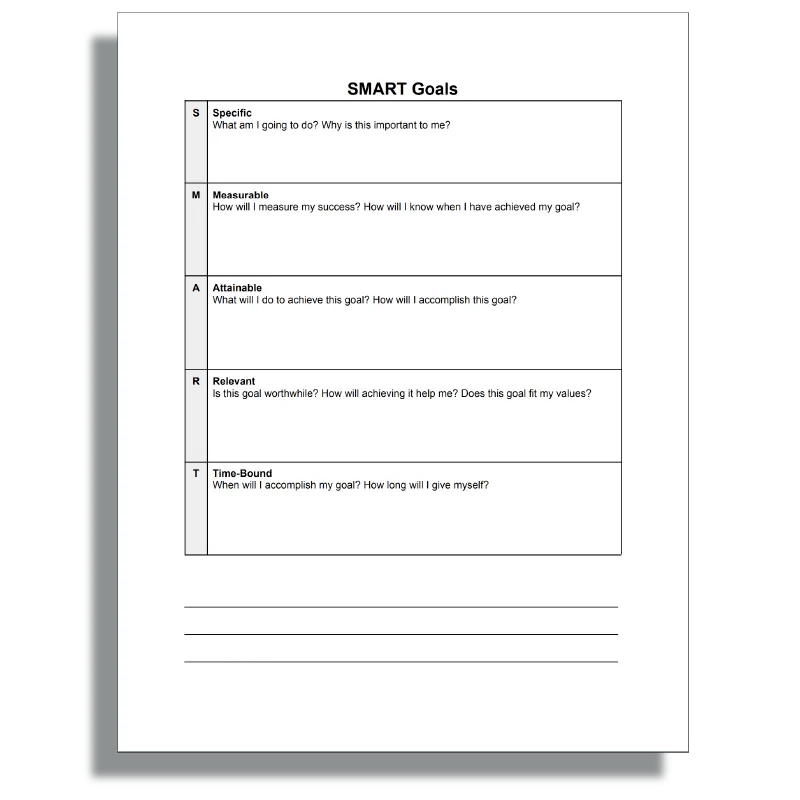
SMART goal worksheet with a built-in action plan for accountability and next steps
Habit Tracker Spreadsheet
Ball State University
Basic, adaptable calendar with blanks for monthly goal or habit tracking
Coping Wheel with Targeted Strategies
Coping Wheel with Blanks
Universal Coaching Institute
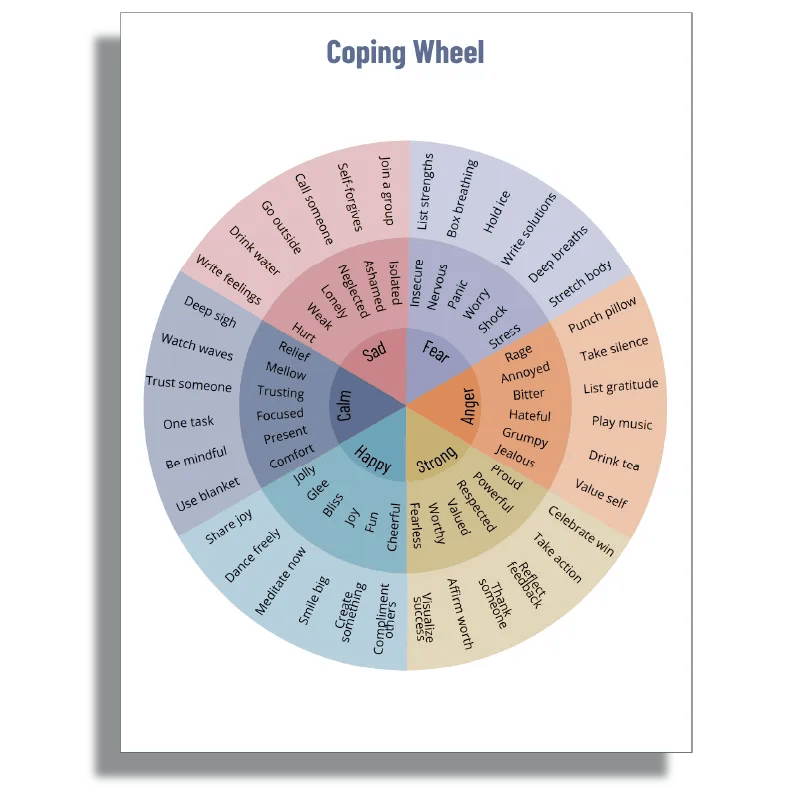
A simple coping exercise in two versions — one that provides an action plan, and the other with blanks to personalize strategies to your client
Wheel of Life Exercise
The Coaching Tools Company
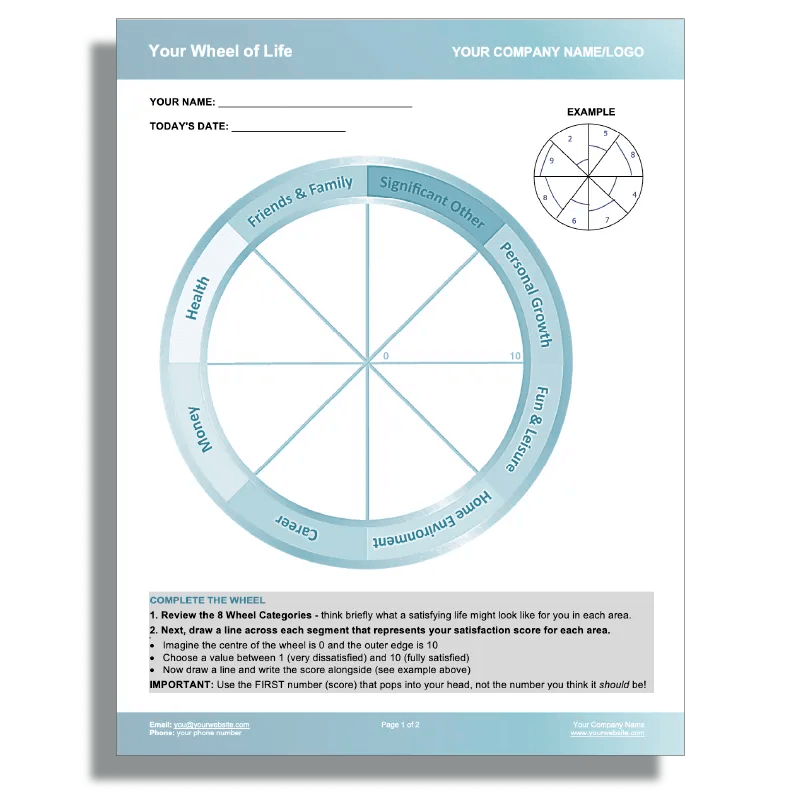
Classic coaching exercise that helpfully includes an example and instructions on the worksheet
How to Personalize a Life Coach Template
Your choices for life coach templates are almost unlimited, so use the best ideas from multiple sources. Try combining templates or adapting an exercise with extra instructions or a new angle. You can also use AI to suggest updates to an existing exercise — here are a few ideas.
AI Prompts to Adapt Coaching Templates
Customize a Resource
Please create a template that adapts the following habit tracking spreadsheet to include rows for nutrition, sleep, and socialization. [Upload or paste existing spreadsheet.]
Personalize Journaling Prompts
Generate a journaling prompt to help a business coaching client reflect on their roadblocks. These are some of the client’s goals: [List anonymized goals.]
Create an Exercise Worksheet
Generate a worksheet that helps a coaching client clarify what a fulfilling day looks like to them. Include a prompt, plus reflection questions and action steps to apply what they’ve learned.
Life Coaching Tools
In this section: Resources for business management, client care, and marketing.
What Is a Coaching Tool?
Anything that helps you run your practice — from software to insurance to certifications — could fall into the coaching tools category.
Investing in tech for your practice can feel especially nerve-wracking. To make picking tools that work for you feel doable, start by listing the specific business tasks you need help with. Here are some app recommendations that speed up coaches’ most common admin chores.
Popular Tools for Each Coaching Task
Scheduling and session booking
Form, survey, and assessment creation
Accounting and bookkeeping
Course hosting
Website building
All-in-one software
Scalable platform designed for new and experienced coaches
Versatile client and business management
Basic platform for new coaches with a website builder
How to Pick Coaching Tools (Using the S.A.F.E.R Method)
Life Coach School-certified coach and former Zapier employee Jesse Parker recommends evaluating tech tools for coaching with the S.A.F.E.R. method to avoid investing in a dud:
- Support: Does the app have a strong help center or community forum?
- Automatability: Will it reduce your time and effort? Look for automated features you can customize.
- Flexibility: Does it adapt to support your process, or does it force you into a specific way of working?
- Extendability: Does it integrate with apps you already use?
- Reputation: Is it well-reviewed by coaches? Check Product Hunt and app store reviews.
Coaching Tool Recommendations by Business Stage
Start small and upgrade your life coaching tools over time. Free or low-cost apps might handle everything you need at first. As your client list (and your income) grow, you may want tools with more integrated functions or that allow employee access. As a rule of thumb, these are good tool investment goals to aim for:
- Beginning coaches (free to <$50/month): Start with basic, inexpensive tools to find out what works for you. (i.e. Calendly, Canva, PayPal)
- Established coaches ($50 to $150/month): Level up to in all-in-one software with integrations for your favorite programs (i.e. Simply.Coach, HoneyBook, Mailchimp)
- Franchise and enterprise coaching ($150+/month): Invest in robust, scalable software that helps you expand services (i.e. adding online courses with LearnWorlds)
Featured Life Coaching Resources
Not every tool is about speeding up your admin. These curated coaching resources boost your business credibility, protect your practice from legal liability, and help you find new clients.
Life Coach Insurance
Insurance Canopy
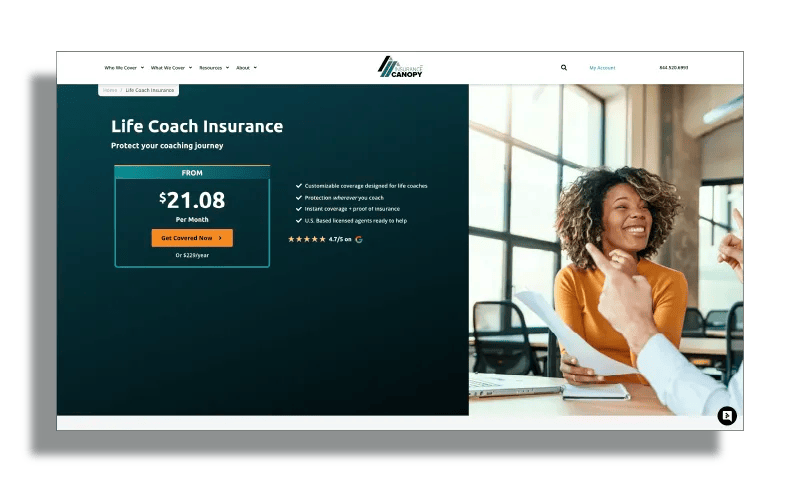
Coverage tailored to life coaching practices starting at $21.08/month.
What Coaching Insurance Do I Need Flowchart
Insurance Canopy
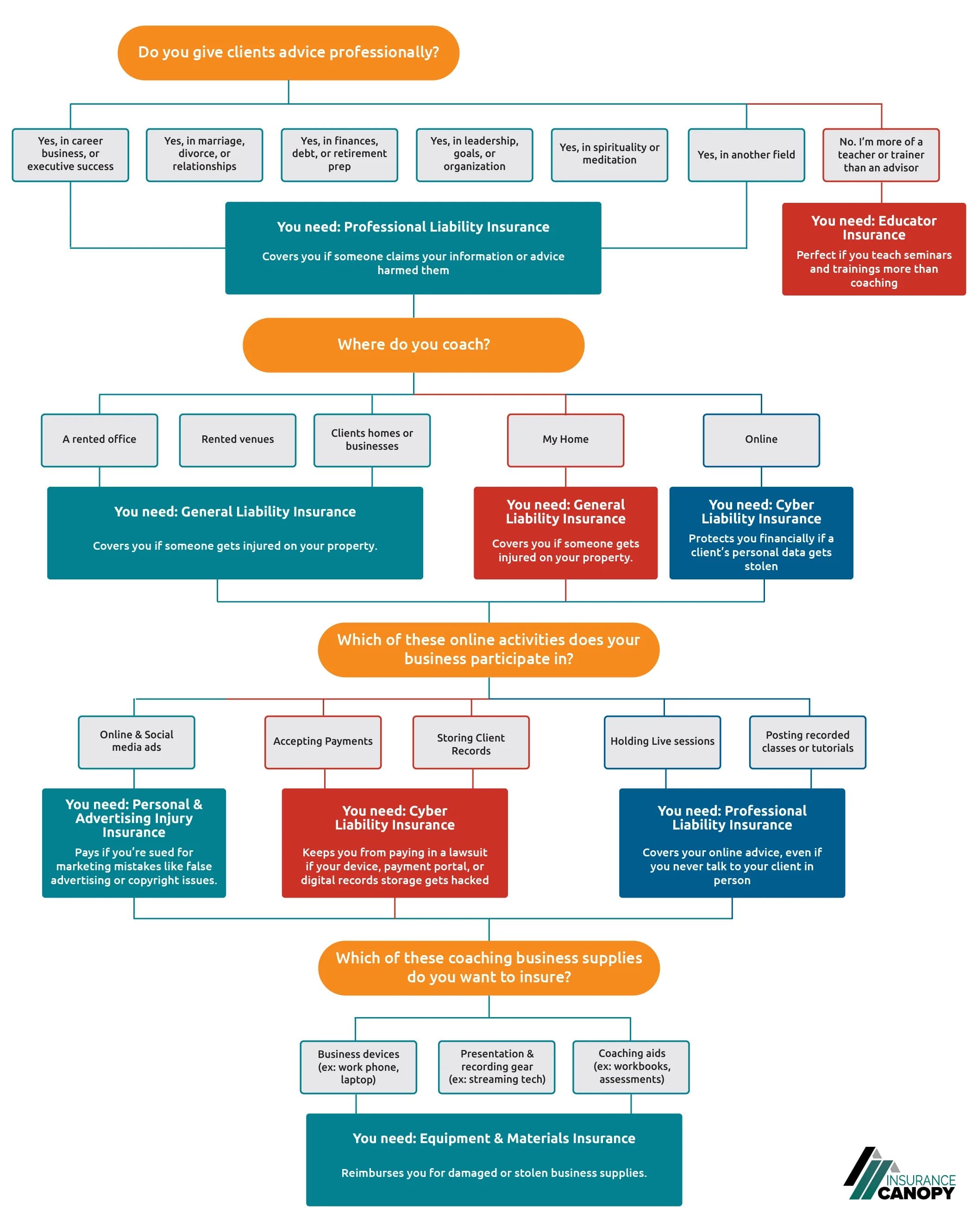
Life coach insurance guide that matches your risks to the types of insurance that cover them
5 Best Coach Certifications Compared
Insurance Canopy
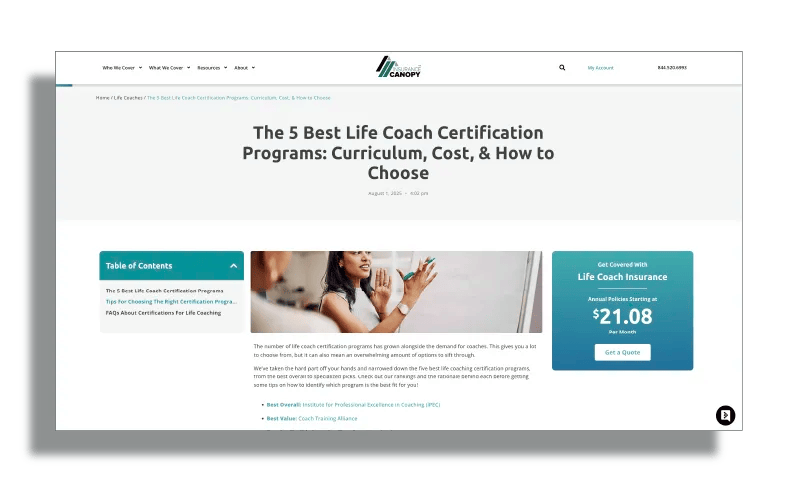
A head-to-head comparison of five of the most respected life coach certification programs
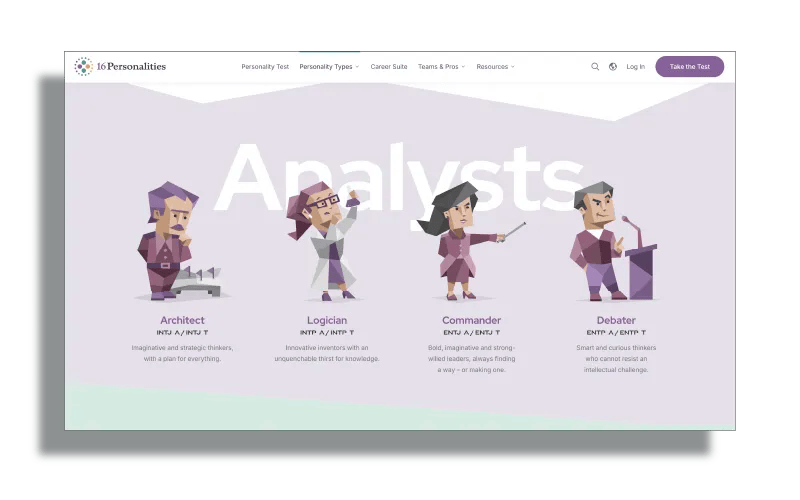
Strengths and Personality Assessments
- CliftonStrengths: Uses positive psychology to help clients identify and embrace what they do well
- Myers-Briggs: A popular, though debated, personality quiz that sorts test takers into 16 personality types
- Five-Factor Model: A more academically validated personality traits assessment
- DiSC: A career-focused assessment that explores how clients relate to others and respond to challenges
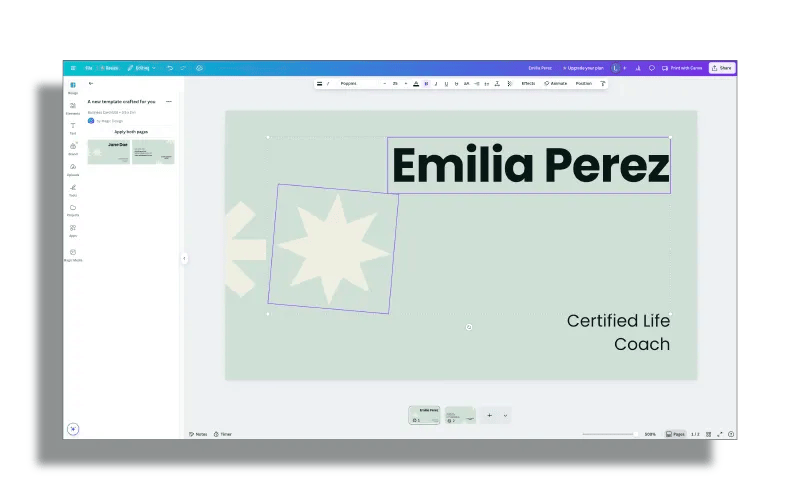
Marketing & Design Tools
- Descript: Reel and video editing software
- Canva: Free template-based design tool for social posts, forms, ads, flyers, and more
- Spotify for Creators: Podcast hosting and distribution
- Metricool: Social media scheduling and analytics
- Fiverr: Freelancing platform — don’t be afraid to hire help!
Building Your Coaching Toolkit
Personalizing a coaching system takes time, but finding the right resources now will help you and your clients reach goals more easily in the long term. How do you know if you’ve found a keeper? The best coaching plans, templates, and tools simplify your coaching, not complicate it.
Keep it simple as you try new resources with this testing approach:
- Add one tool or template at a time
- Track whether it saves time or improves session outcomes
- Keep what works, throw out what doesn’t
New to coaching? Explore how to start a life coaching business or read our no-nonsense guide to life coach insurance to launch your practice on the right foot.

FAQs About Life Coaching Resources
Are free coaching templates worth using?
Absolutely, if they come from a trusted organization or an expert in your coaching niche. A free template can give you a starting point to build customized resources for your own coaching program (without breaking the bank or reinventing the wheel). Look for free resources that are easy to personalize and follow coaching best practices.
Where can I find reliable free life coaching worksheets?
Universities, professional coaching organizations (like ICF), and established coaches or coaching institutes often publish high-quality free templates and tools.
What’s the most popular life coaching template?
The Wheel of Life is probably the most recognizable life coach exercise. It’s simple, visual, and highly adaptable for any coaching niche.
What tools should a new coach start with?
Basic coaching tools that any life coach might use to start a practice include:
- A scheduling app (like Calendly)
- A payment portal (like Stripe)
- A client intake form
- A client agreement form or contract
- An email platform (like Gmail)
- A simple design and marketing tool (like Canva)
How do I structure a coaching plan?
How to build a coaching plan depends on whether you want to create a session plan or a program plan. A basic 30- to 60-minute coaching session plan includes these steps:
- Check-in: Review the last session and check for any client concerns or questions
- Focus topic: Explore the main goal of the session with questions and exercises
- Action planning: Establish next steps to put the goal into practice and create an accountability framework to complete the goal
A coaching program plan consists of multiple session plans, each with a specific goal topic that builds toward the client’s bigger objectives. Program plans usually span several weeks or months.





